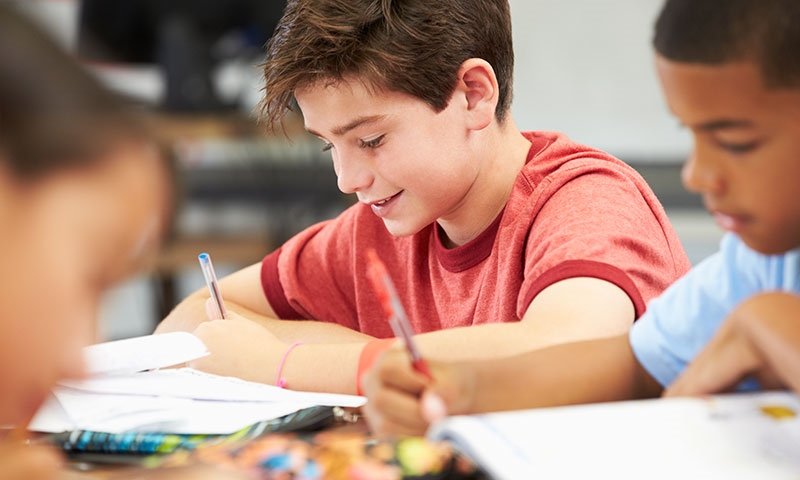Seventh grade marks a pivotal year in a student's academic journey. As they transition from the foundations built in elementary school, they encounter a wider range of subjects and delve deeper into complex concepts. Effective textbooks become an invaluable resource, a supportive guide and a springboard for learning.
But textbooks go beyond just information delivery. They act as engaging companions, presenting concepts in a clear and accessible manner, often incorporating visuals, diagrams, and curated exercises to solidify understanding. This multifaceted approach caters to different learning styles and helps students grasp even the most challenging topics.
Core Subjects and Textbooks
Seventh grade marks a pivotal year in a student's academic journey. They delve deeper into complex concepts across various subjects. Let's explore how textbooks play a vital role in supporting mastery across these core subjects.
Science

Seventh-grade science ignites curiosity and understanding of the natural world. Key concepts explored often include cells, human body systems, Earth science topics, and the scientific method. A clear and concise year 7 science textbook should provide explanations of scientific phenomena, break down complex concepts into understandable language and utilise diagrams and models for better comprehension.
Complex scientific concepts can be daunting. A good year 7 science book breaks them down into easy-to-understand language, often incorporating diagrams, models, and illustrations. Imagine cells explained not just with text, but colorful visuals showcasing their structure and function.
Integrating experiments and activities allows students to apply scientific principles, solidifying learning through hands-on experiences. Engaging pictures, diagrams, and illustrations enhance understanding and make complex topics more relatable. Finally, connecting science to real-world applications demonstrates how science impacts our daily lives and fosters a sense of wonder for the world around us.
Science doesn't exist in a vacuum. Valuable year 7 science textbooks demonstrate how scientific concepts impact our daily lives. Imagine exploring the science behind renewable energy sources or the connection between cell structure and disease. Fostering a sense of wonder for the world around us, these connections spark a lifelong interest in science. With these features, a year 7 science textbook becomes more than just a collection of facts, it becomes a springboard for exploration, igniting a passion for scientific discovery.
Math
Seventh-grade math builds on the foundation of elementary school and propels students towards higher-level thinking. Key concepts explored include fractions, decimals, proportions, and pre-algebra. A good 7th-grade math textbook should offer clear explanations, and break down complex topics into easy-to-understand steps. It should also provide ample practice problems to solidify understanding, integrate visual aids like diagrams and charts, and embrace technology by offering access to online resources.
Language Arts
Seventh-grade Language Arts equip students with the tools for effective communication and critical thinking. The focus areas include reading comprehension, grammar and mechanics, writing, and vocabulary development. A valuable 7th-grade Language Arts textbook offers engaging texts, and a diverse selection of reading materials from different genres and cultures to cater to various interests and promote a love for reading.
Exposure to diverse voices through texts written by authors from different backgrounds broadens understanding and encourages critical thinking about various perspectives. The textbook should also present opportunities for critical thinking through thought-provoking questions and activities. Writing prompts across different genres encourage students to practice writing and hone their storytelling skills, while grammar practice exercises provide ample opportunities to master grammar rules and punctuation techniques.
Social Studies
Seventh-grade social studies takes students on a journey through history and social development. Common historical periods and topics include ancient civilisations, medieval history, and American history. A valuable 7th-grade Social Studies textbook should encourage students to analyse different types of historical evidence, such as primary and secondary sources, to understand the past.
Highlighting diverse perspectives by incorporating historical events and figures from various cultures and backgrounds fosters global understanding. Utilising historical maps and timelines visualises the flow of history, creating a sense of chronology and spatial awareness. Finally, the textbook should offer research and critical thinking, encouraging students to conduct independent research and develop critical thinking skills by forming their interpretations of historical events.
Beyond the Textbook

While textbooks provide a strong foundation, the world of learning extends far beyond their pages. The digital age offers a treasure trove of online resources that can significantly enhance a 7th grader's understanding and engagement with various subjects.
A Universe of Websites
Educational websites abound, catering to every subject imaginable. These websites often present information in interactive formats, with games, quizzes, and age-appropriate articles that make learning fun and engaging. Imagine exploring the wonders of the human body through a virtual tour or practising math concepts through interactive games.
Simulations that Come Alive
Interactive simulations allow students to experience complex concepts in a virtual world. Imagine dissecting a virtual frog in science class or conducting virtual experiments on weather patterns. These simulations provide a safe and engaging way to explore concepts that might be difficult or impractical to experience in a traditional classroom setting.
The Power of Choice
Seventh grade marks a transformative year in a student's academic journey. As they delve deeper into complex subjects, choosing effective textbooks becomes crucial. These textbooks provide a structured framework, clear explanations, and engaging content, acting as a stepping stone for math, language arts, science, and social studies.
However, textbooks are just one piece of the learning puzzle. To create a truly enriching experience, it's essential to venture beyond their pages. An array of digital resources awaits, offering interactive simulations, educational apps, and engaging websites. These resources provide additional practice, captivating visuals, and diverse learning pathways, catering to different learning styles and fostering a deeper understanding of the subject matter.
